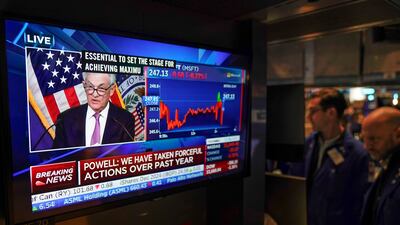Inflation in the US remained elevated on an annual basis for the month of January boosted by rent and energy prices, indicating that the Federal Reserve's moderate interest-rate increases will continue.
The Consumer Price Index overall slowed to 6.4 per cent year-on-year, from 6.5 per cent the previous month, smallest annual increase since October 2021, a report from the Bureau of Labour Statistics (BLS) said. An Associated Press survey of economists had predicted annual inflation would slow to 6.2 per cent in January.
On a monthly basis, the CPI rose 0.5 per cent last month after increasing 0.1 per cent in December.
“The index for shelter was by far the largest contributor to the monthly all-items increase, accounting for nearly half,” the report said.
Food, petrol and natural gas also contributed. The rent index rose 0.7 per cent and energy prices increased for the first time in three months.
Core CPI, which excludes food and energy, rose 0.4 per cent in January and 5.6 per cent year-on-year.
With inflation still running above the Federal Reserve's long-term target of 2 per cent, the central bank must determine for how long it intends to maintain its tightening of monetary policy.
One significant obstacle in the way of the Fed's efforts to maintain a soft landing is the nation's labour market. The economy added 517,000 jobs last month and unemployment dipped to a new 53-year low of 5.3 per cent.
President Joe Biden hailed the economic data as a sign that his administration was delivering a strong economy, but Fed chairman Jerome Powell and his colleagues have repeated concerns that a tight labour market adds to inflationary pressures.
“Inflation in America is continuing to come down, which is good news for families and businesses across the country,” Mr Biden said in a statement. There was “more work to do” to return to stable growth, he added.
Mr Powell has previously indicated some workers would have to feel some “pain” in the central bank's efforts to tamp down on inflation, which he does not expect to return to 2 per cent until next year.
Traders anticipate the Fed will raise interest rates by an additional 25 basis points when policy officials meet next month, according to CME's FedWatch Tool.
“This report, combined with the booming jobs market, will certainly raise questions at the Fed’s Monetary Committee meeting next month,” said Neal Keane, head of sales trading at brokerage firm ADSS.
Interest rates now stand at 4.58 per cent after being near zero at this time last year. The Fed initially estimated interest rates would hover around 5.1 per cent by the end of 2023, though Mr Powell has said the central bank will adjust its end-of-year forecasts during its March 21-22 meeting.
Thomas Barkin, president of the Federal Reserve Bank in Richmond, told Bloomberg the central bank may need to raise interest rates above what was anticipated if inflation remains high.
“If inflation persists at levels well above our target, maybe we’ll have to do more,” he said.
Stock markets opened lower on Tuesday morning after the inflation report. The S&P 500 and Nasdaq Composite fell 0.6 per cent and 0.8 per cent, respectively, while the Dow lost 15 points.


